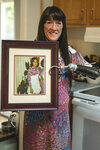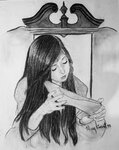


Fourteen years ago Mary McGriff was exhausted. Tired after more than three decades of powering through excruciating pain, bottling all her pent-up anger, hanging on to vengeful hatred and battling what felt like endless depression.
“Trauma devastates a person,” she said.
September 2023 will be 45 years since the former Mary Vincent, then 15 years old, took a ride with the wrong person while hitchhiking from Berkeley, California, to the Los Angeles area. Later that night she was kidnapped, violently raped, and had her arms cut off below the elbows with a butcher knife before being left to die in a culvert in a secluded ravine near Modesto.
Alone and losing blood, she somehow was able to muster the courage and energy to crawl out and walk three miles to find help.
Based on the information she provided, police arrested her attacker — 51-year-old Lawrence Singleton — less than two weeks later in Nevada. He was eventually convicted and sentenced to 14 years in prison. McGriff spent a month in the hospital recovering from various injuries, including the surgical amputations of her arms, and adjusting to her new prosthetics.
“I was so talented with my hands (before the attack),” said McGriff, now 60 and living in Vaughn with her husband. “I could do anything: play instruments, do hair and makeup, pottery, paint.”
The one thing she didn’t have a grasp on was drawing. It didn’t come naturally to her and anything she drew didn’t turn out right. Then, out of nowhere, it seemed she developed a talent for it.
What changed?
“I lost my hands.”
For the first few years after the attack, McGriff didn’t want to sleep. She did anything she could to avoid the nightmares stemming from her trauma. One night, soon after she got out of the hospital, she was staring at herself in a little mirror in her bedroom, and without realizing it she was gripping a pencil with the metal prongs of one of her new prosthetic arms and she started drawing herself. “It looked just like me. And then I drew a horse that actually looked like a horse.”
While many people have the shakes or the jitters, McGriff said the advantage of her prosthetic hands is it gives her an easy, smooth stroke when she draws or paints.
But along with little sleep, she was suffering from big bouts of depression. At the time the only things she used to treat her mental health were art and reading — two places she could go to escape the real world.
“It seemed to draw me out of that pit of hell, and I felt good for that moment,” she said.
McGriff used her art to create beauty out of her depression. She found animals (she has a bald eagle painting hanging in a hallway in her home) and strong women (a drawing with a woman wearing makeup displayed in her living room) to be her main focus for her art. She’s fascinated by hands, but it’s not why you’d think. “It’s not because I miss my hands. They’re just so difficult to draw — it’s the dimensions. Everyone seems to get hands wrong, but for some reason, I get them right.”
Out of the 4,000 pieces of art she created since her attack, she sold or donated all but seven. McGriff knows most of those sales are for collectors intrigued enough to buy from an armless artist with a dark backstory.
Then, as quickly as she developed the talent to draw in 1978, she lost it altogether 14 years ago.
She chose an odd thing to blame for the sudden stoppage: joy.
“I kid you not, I haven’t drawn a thing or read a book since I met (her now husband),” she said. “With him, I’m living life instead of drawing it or reading about it.”
All of her hate, anger and daily depression — the motivation behind her best artwork — quickly disappeared. And McGriff couldn’t be any more excited about it.
“I wouldn’t trade my happiness for anything in the world right now. That’s all I’ve ever wanted.”
She finds art in other things now, like gardening, nurturing birds in her yard and cooking ethnic foods. She’ll occasionally pick up a pencil and see what happens.
“It just doesn’t look like before,” McGriff said. “It looks like a cow took a turd on my paper. I’ve burned everything I’ve drawn recently.”
McGriff is much more of a homebody today. She knows that comes with people thinking she’s a “sad hermit,” but that’s not the case.
“I’m just happy with life. I try to help others see through my eyes. You shouldn’t give up hope. It’s still a good life. There’s so much out there. It’s beautiful. It’s not a matter of looking for it or making it happen — you just should accept happiness when it does come to you.”
UNDERWRITTEN BY THE FUND FOR NONPROFIT NEWS (NEWSMATCH) AT THE MIAMI FOUNDATION, THE ANGEL GUILD, ADVERTISERS, DONORS AND PEOPLE WHO SUPPORT INDEPENDENT, NONPROFIT LOCAL NEWS